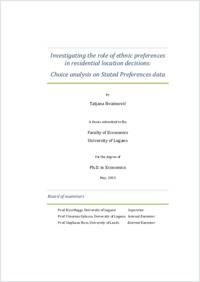Investigating the role of ethnic preferences in residential location decisions : Choice analysis on stated preferences data
- Ibraimovic, Tatjana
- Maggi, Rico (Degree supervisor)
-
08.05.2013
151 p
Thèse de doctorat: Università della Svizzera italiana, 2013 (jury note: summa cum laude)
Ethnic residential segregation
Urban segregation in Europe
Ethnic segregation preferences
Voluntary segregation
Residential location choice behaviour
SP experiment of neighbourhood choice
Stated preferences choice methods
Reference dependence
Asymmetric preferences
Observed and unobserved heterogeneity
Multinomial logit model
Mixed logit model
Latent class choice model
Random parameters choice model
English
Ethnic pluralism and its increasing trend across European countries has sparked the debate on residential segregation, a phenomenon that has various repercussions at economic, social and urban dimensions of modern societies. Two main segregation drivers are argued to be at the basis of ethnic clustering: preferences and constrains, first leading to voluntary and second to involuntary segregation outcomes. Even if largely evoked by academics and politicians, the theories over the existence and impact of ethnic preferences on residential location choices of immigrants and natives still lack the support by strong empirical evidence. This thesis addresses such issues, analysing ethnic determinants of residential location choice of inhabitants in the City of Lugano, Switzerland. In particular, it proposes an innovative way of studying the voluntary component of ethnic segregation, mainly represented by preferences of households for living next to their co-nationals and to other foreign communities. For this purpose, a specifically designed Stated Preferences experiment of Neighbourhood Choice is used, allowing us to compute preference indicators as well as to give indications of the value that households place on ethnic neighbourhood characteristics in form of willingness-to-pay (WTP) measures and trade-offs with other main residential choice drivers. In this way we can determine the degree of importance of ethnic versus other location factors for different population segments. In the analysis a particular attention has been given to the investigation of behavioural aspects of residential location choice and to the latent heterogeneity across population segments, giving some important insights into the factors that influence more or less strongly the self-segregation preferences of different ethnic communities. The results of this study offer several policy indications, which can be a valuable contribution for urban planners, social workers and public policy makers.
- Language
-
- English
- Classification
- Economics
- License
-
License undefined
- Identifiers
-
- RERO DOC 32276
- URN urn:nbn:ch:rero-006-111804
- ARK ark:/12658/srd1318542
- Persistent URL
- https://n2t.net/ark:/12658/srd1318542
Statistics
Document views: 355
File downloads:
- Texte intégral: 260
